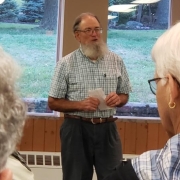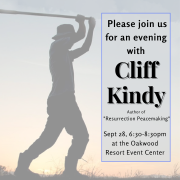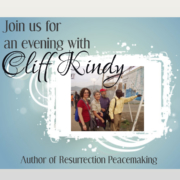Posts
Cliff Kindy shared stories of his non-violent peacemaking as part of the Christian Peacemaking Team (CPT) to an audience of about 50 people last Wednesday night at a Chautauqua Wawasee event held at Oakwood.
Cliff and other CPT members were in a Baghdad hotel at the start of the Second Gulf War. They hoped that American pilots might refuse to bomb Iraq if they knew American grandparents were on the ground. They received a disturbing phone call – the bombings would begin in three hours. He asked the audience what they would do during those three hours and then paused to let them reflect. His CPT members shared emotions, prayed and sang songs.
Cliff shared other stories of his involvement in Iraq. One time, the CPT members were held at gunpoint. They also stayed at a water treatment plant to deter its bombing. In the First Gulf War, U.S. bombers targeted water treatment plants which later resulted in the death of 800,000 children from drinking bad water.
The CPT team was required to leave Iraq and drove through dangerous territory where they had a car accident. Several of the team members were hurt and Cliff himself sustained a life-threatening head injury. The injured were taken to an Iranian clinic that was bereft of medical supplies due to U.S. sanctions. The doctor overlooked the fact that, technically, these Americans were his enemy. He chose to see them as human beings in need, treated everyone’s injuries, and saved Cliff’s life.
Cliff also shared stories from other global troubled spots. He helped rebuild Palestinian homes destroyed by the Israeli military. He staged sit ins at the U.S. Navy bombing test grounds in Vieques, Puerto Rico resulting in several arrests. He also helped refugees return to their subsistence farms in Chiapas, Mexico, and helped refugees in Goma, Congo.
Churches and other groups in these trouble spots invited CPT to help. Cliff felt privileged to personally grow as he experienced the courage and nonviolent power of these local partners – what he calls “resurrection power.”
In each of these cases, Cliff and his CPT colleagues had to consider what tools they possessed to deter violence. Cliff then asked the audience what tools they currently possess. Responses included conservation, recycling, public transportation, restricting meat, not responding to fear, listening, and starting conversations with strangers. Cliff considered all of these tools as forms of resurrection power.
Cliff further explained that resurrection power stems from simple actions that tend to introduce hope into otherwise hopeless situations, oftentimes resulting in power shifts away from armed empires into the hand of ordinary people who are merely trying to survive.
Cliff and his wife, Arlene, live near North Manchester on a 7-acre organic farm. Their sole income comes from selling produce at farmers’ markets, intentionally keeping their income below federal tax levels to protest America’s $800 billion military budget. Solar panels supply their electricity and rainwater provides their water needs. Over the years, both Cliff and Arlene have participated in hundreds of disaster mission trips through the Brethren disaster relief ministries.
Arlene is planning to spend two months in Tennessee helping to rebuild communities devastated by flooding earlier this year. Cliff is seriously considering a request for CPT to fly to Ukraine and stay at a nuclear power plant in an effort to deter further Russian bombings.
2022 Cliff Kindy Workshop
What if Christians had the passion for peacekeeping that warriors have for war?
Participate in an evening with author and peace-seeker Cliff Kindy, an Indiana organic farmer.
Cliff will share about his many Christian Peacemaker Team journeys (Iraq, Sudan, Iran…), and how he became part of CPTs. The workshop will explore and discuss how Christians who are passionate about peace (everywhere) can pursue the vision of peacekeeping. Cliff’s session promises to be eye-opening and extremely moving.
Cliff’s book Resurrection Peacemaking recounts his thirty years working with Christian Peacemaker Teams (CPT), facing violent, unjust regimes in Iraq, Colombia, Israel/Palestine, Nigeria, Mexico, and other trouble spots around the world. Cliff and other CPT volunteers have repeatedly put their lives on the line as they chose to accompany targeted and beleaguered indigenous people who were striving to end violent occupation and warfare in their own lands.
This striving is not only for far-away peoples. It is for us.
Cliff says, “Why will people be willing to risk their lives to confront violence or injustice? For me, that willingness is grounded in the gospel story of Jesus’ resurrection. For others, it will be based in love and goodness. Nonviolence for me is powered by the spirit of resurrection on Easter; it topples empires. But it also exposes the practitioner to transformation; all parties are transformed, or better, ‘plowshared’. Are we willing to nurture our imaginations and take the risks required to replace violence with nonviolence? If so, how would this change America, in terms of policing, politics, wars, family disputes, mass killings, and criminal justice?”
What: Presentation/Discussion/Workshop
When: Sept 28, 6:30-8:30pm
Where: Oakwood Resort Event Center
Cost: Free– Please REGISTER HERE for this event
Chautauqua-Wawasee is hosting an evening with author and peace-seeker Cliff Kindy, an Indiana organic farmer. His book Resurrection Peacemaking recounts his thirty years working with Christian Peacemaker Teams (CPT), facing violent, unjust regimes in Iraq, Colombia, Israel/Palestine, Nigeria, Mexico and other trouble spots around the world. Cliff and other CPT volunteers have repeatedly put their lives on the line as they chose to accompany targeted and beleaguered indigenous people who were striving to end violent occupation and warfare in their own lands. This striving is not only for far-away peoples. It is for us.
Cliff says, “Why will people be willing to risk their lives to confront violence or injustice? For me, that willingness is grounded in the gospel story of Jesus’ resurrection. For others, it will be based in love and goodness. Nonviolence for me is powered by the spirit of resurrection on Easter; it topples empires. But it also exposes the practitioner to transformation; all parties are transformed, or better, ‘plowshared’. Are we willing to nurture our imaginations and take the risks required to replace violence with nonviolence? If so, how would this change America, in terms of policing, politics, wars, family disputes, mass killings, and criminal justice?”
In this workshop, Cliff will…
1. Share some direct encounters that CPTers have had with violence and injustice;
2. Explain why nonviolent tools are better than violent methods, by any measure, including effectiveness, cost, availability and consequences.
What: Presentation, discussion, and workshop
Where: Syracuse, Indiana, Oakwood Resort, Event Center
When: October 6, 6:30 – 8:30 p.m.
Free to attend. Registration requested, but not required…helps us plan room size.
To register go to www.CHQW.org or call Debbie at 574-377-7543 or go to Facebook.com/ChautauquaWawasee
Or, you may register at Eventbrite BY CLICKING THIS LINK.




